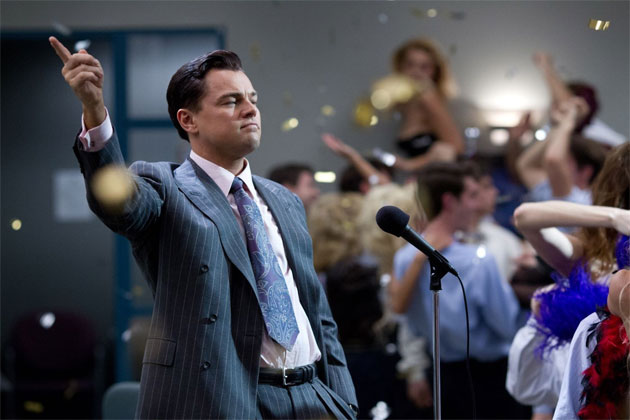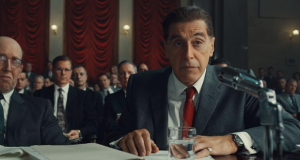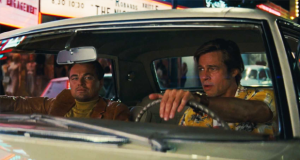“Is it a confession or a boast?”
Radio deejay Simon Mayo asked Leonardo Di Caprio that very question about The Wolf Of Wall Street and your interpretation and enjoyment of the film likely hinges on your own answer. Do you think this film is a confession or a boast? Which do you want it to be?
The Wolf Of Wall Street is a film adaptation of the memoirs of Jordan Belfort, a fraudulent New York stockbroker who made a fortune selling ‘penny stocks’ to gullible investors in the Nineties. With the modest success of his start up company under his belt, Belfort creates a large legitimate sounding corporation named Stratton Oakmont and takes his exploitative sales tactics to a national level, creating a multimillion dollar company that thrives on selling shares of dodgy businesses to the unsuspecting public.
During this time, Belfort and his friends lead an extraordinarily extravagant lifestyle that includes taking excessive amounts of drugs, having orgies in the office and spending money in the most lavish ways imaginable.
The film is a mammoth three hour affair and is a modern day crime epic. It has plenty of humour, raucous energy and a hugely charismatic lead in Leonardo Di Caprio. Jordan Belfort is a loathesome man who is adulterous, a drug addict, endangers his children and financially ruined millions of lives but the film treads a line of moral ambiguity by focusing on the sex parties and ignoring the devastation that he causes. I believe there is a good chance that this film will become a cult classic to the same audiences that covet Scarface. There’s no question that Jordan is a monster but he is powerful, good looking and rules over his company with a God-like reverence from his employees.
Although The Wolf Of Wall Street is not set during the recent global financial crisis, the content of the film will naturally lead most audience members into thinking back to that time. And whereas Margin Call, Win Win and Up In The Air all offer somber, introspective looks at the fall out of the GFC, The Wolf Of Wall Street is the only film I can recall that has the stones to invite the audiences into looking at just how much fun the irresponsible stockbrokers had when they blew your life savings. The crazy part? I think there’s a good chance that this will be the most widely remembered of those films and it will win over a certain audience who are allured by the hedonistic scenes of excess and they will think ‘I want to be Jordan Belfort.’
Belfort, Di Caprio and Scorcese have all stated that The Wolf Of Wall Street is a ‘cautionary tale’ or words to that effect. I challenge that. The final third of the film, when Belfort begins to spiral out of control, shows him at his worst. He strikes his wife. He can barely function due to his drug addiction. He graduates from intense narcissism to declaring himself a deity. And yet the film’s denouement is jarringly swift and unsatisfying. When the FBI finally bring him to justice he serves a couple of years in a minimum security prison that has a tennis court. He recants on his past behavior… by writing a best selling book and using it as a means to start his next money spinning endeavour. When we see the FBI agent who brought him justice taking the ride home on the subway we realize this is a film where crime does seem to pay. When we see the cameo of the real Jordan Belfort at the end of the film we realize he’s a weird bug-eyed looking guy. They shouldn’t have cast Leonardo Di Caprio as Belfort, they should have got Stephen Merchant.
I can admire The Wolf Of Wall Street to a certain degree. I think Scorcese spins an incredible story here and the film has some moments of fantastic comedy and genuinely affecting pathos. The supporting cast in the film is universally excellent and in particular, I loved Matthew McConaughey’s role as the jaded, experienced Wall St broker who shows Jordan the ropes.
That said, there is also something equally soul destroying about a film that glamourizes Belfort’s behavior. I work with a lot of young people in sales and many of them are completely taken with admiration for Belfort. I think Scorcese purposefully framed Belfort to be more palatable to the audience than he is willing to admit. He picked an attractive and charismatic lead in Di Caprio. He glosses over the untold damage that Belfort causes to focus on his next sex party. And I think its a cop out that he seems unwilling to take responsibility for that.
I can think of few films that have left me in two minds as The Wolf Of Wall Street did. At times, I think its an incredible piece of work. Other times, I think its an incredibly irresponsible piece of work.
Is it a confession or a boast?
What do you think?
Review Overview
RATING
GOOD
Summary : Hilarious, unbelievable and morally dubious.
 The FAT Website est. 1999
The FAT Website est. 1999






